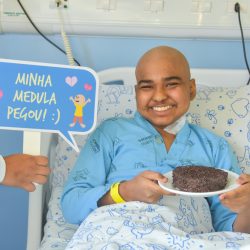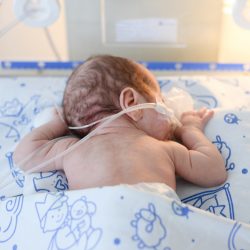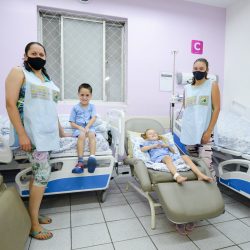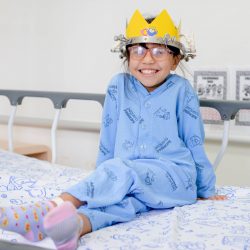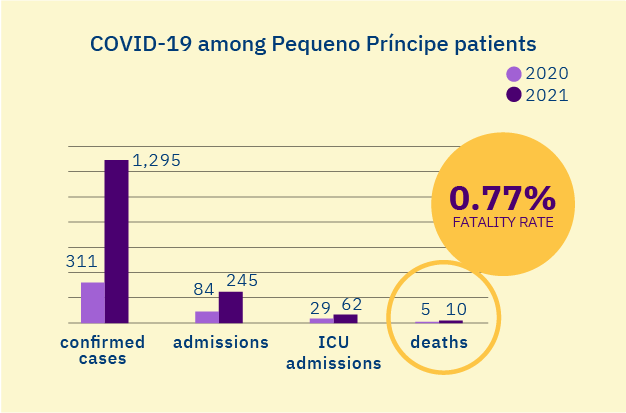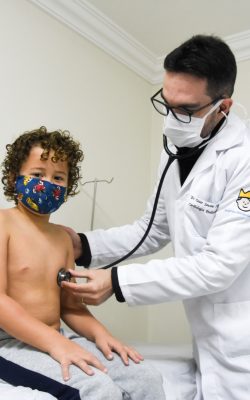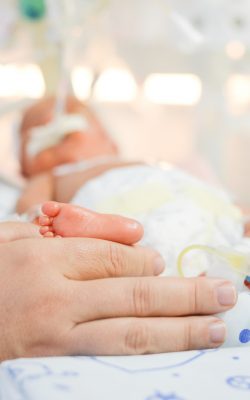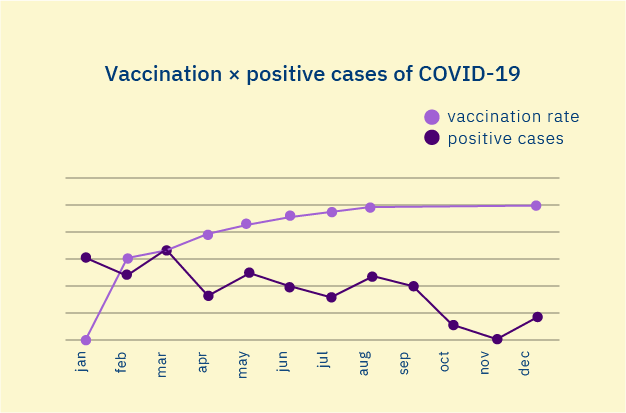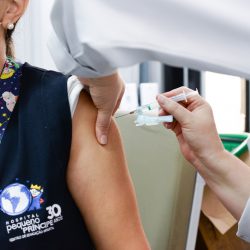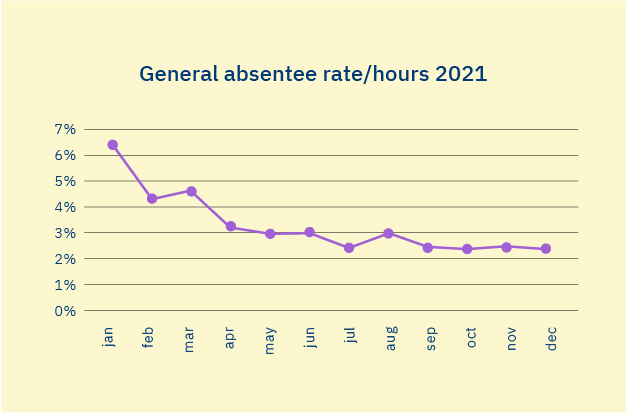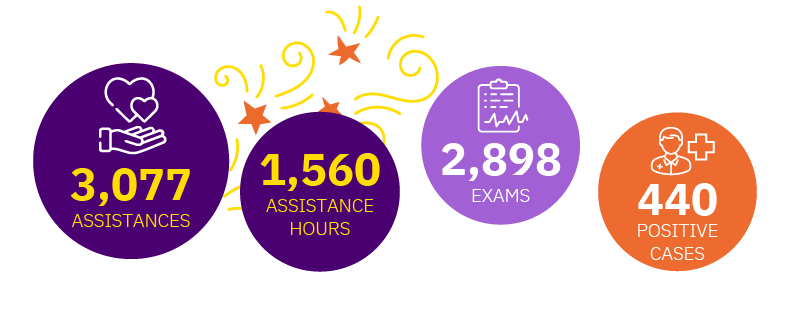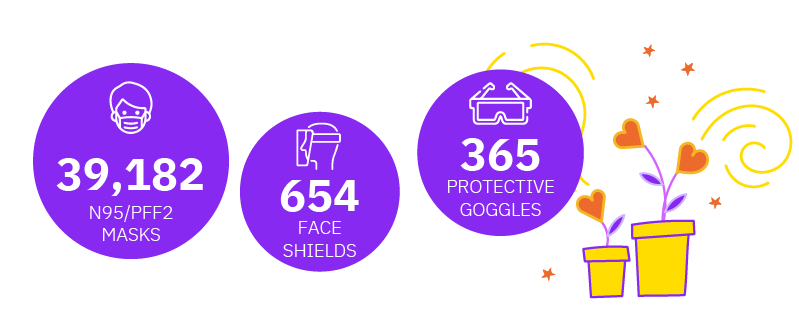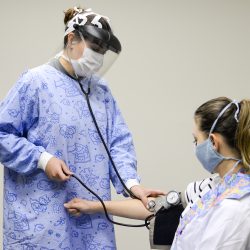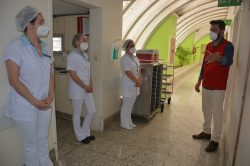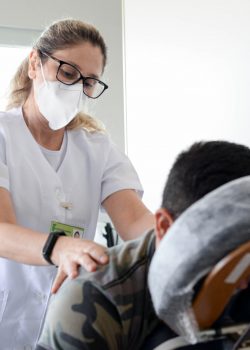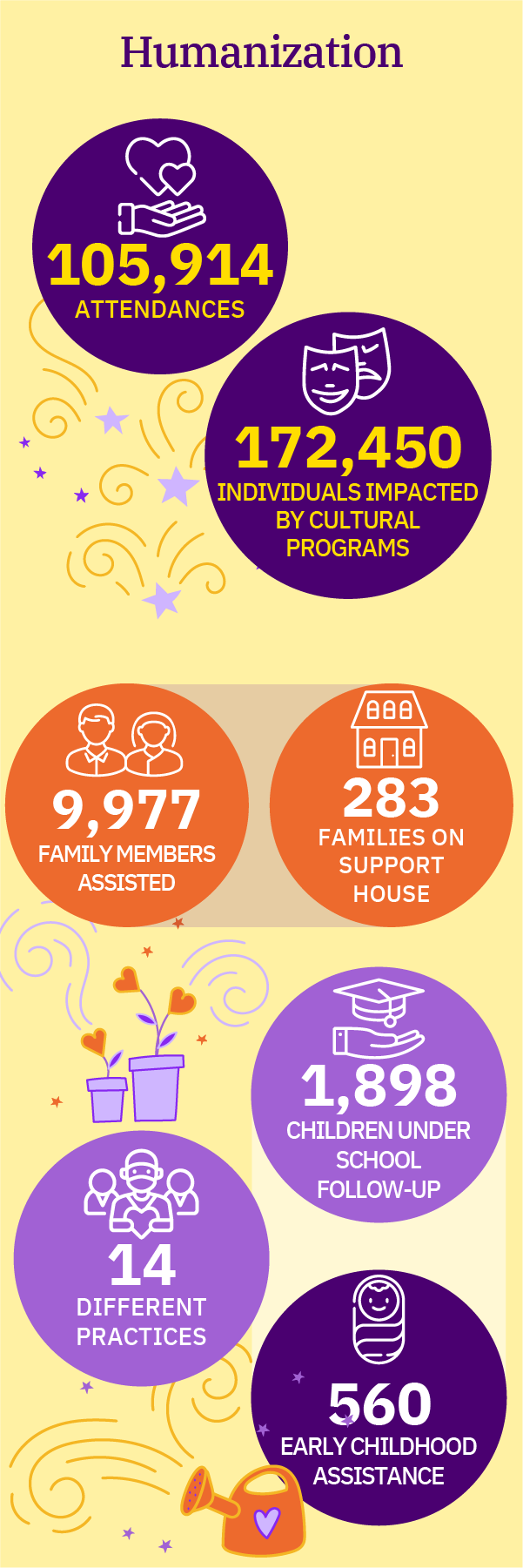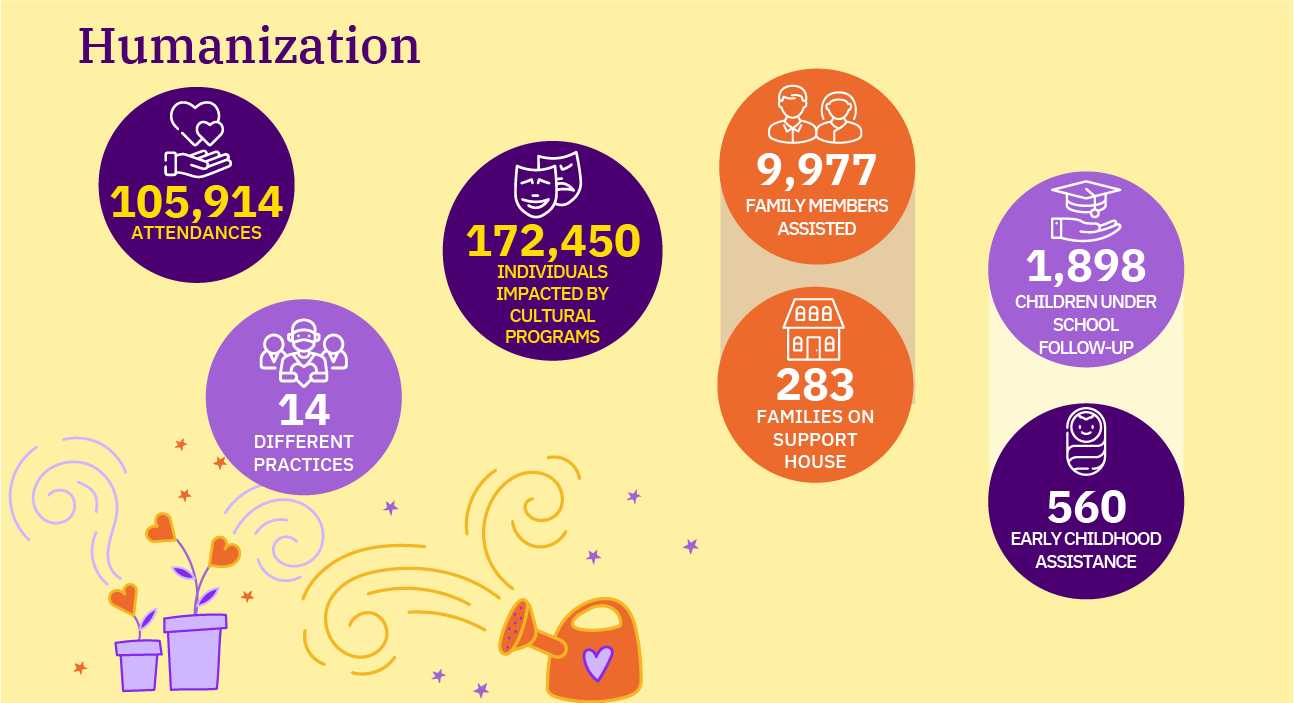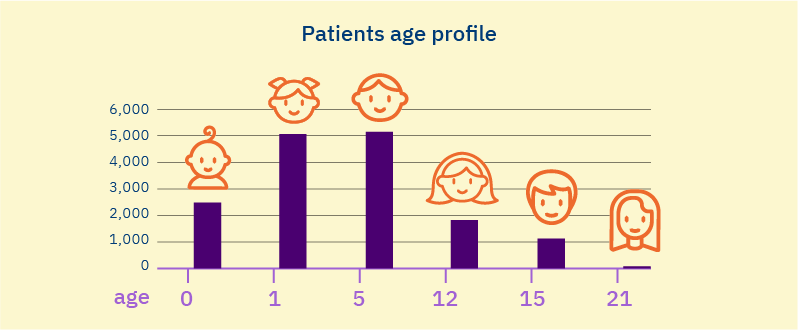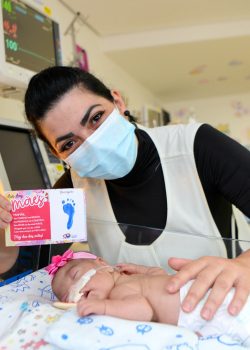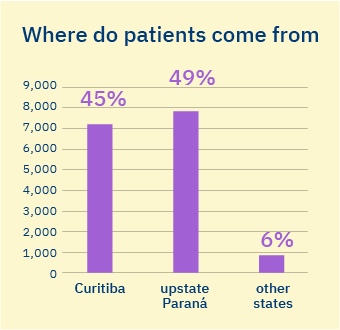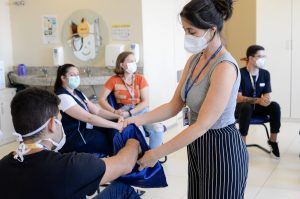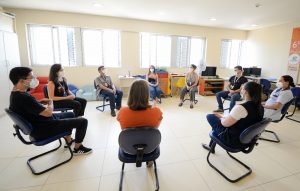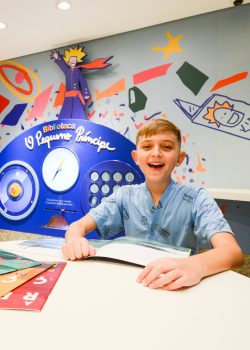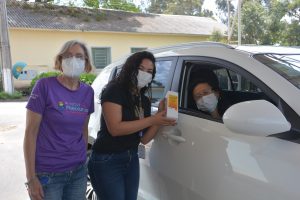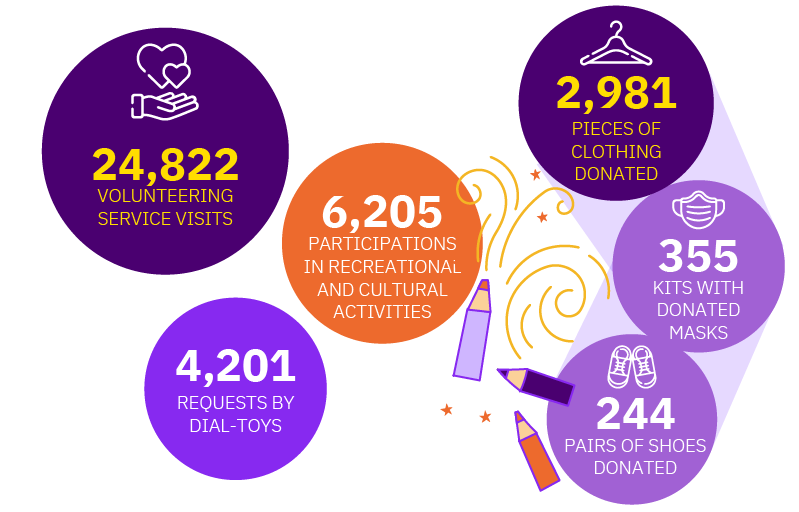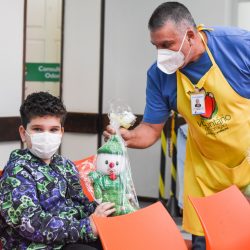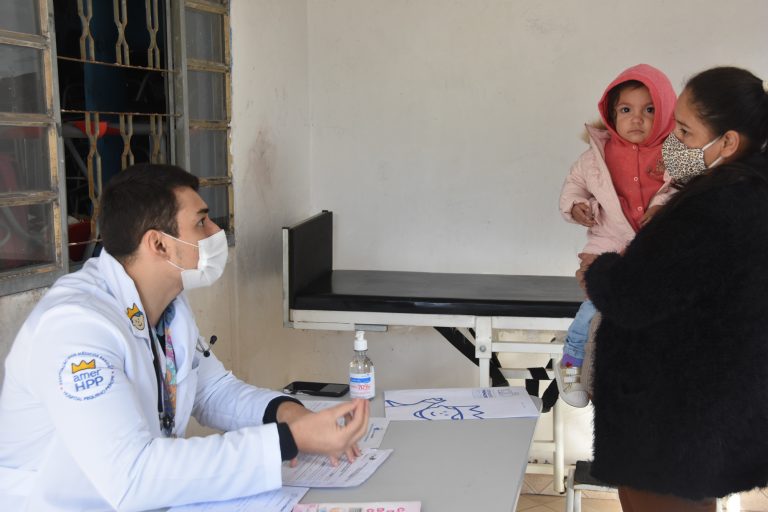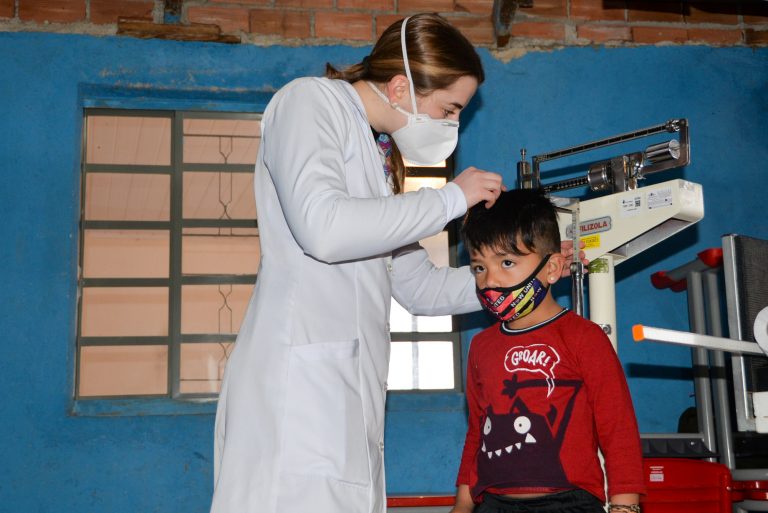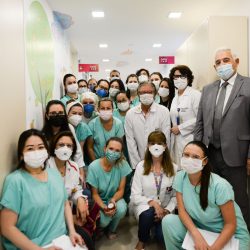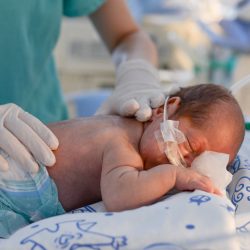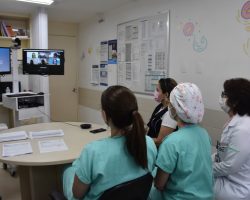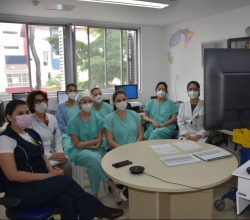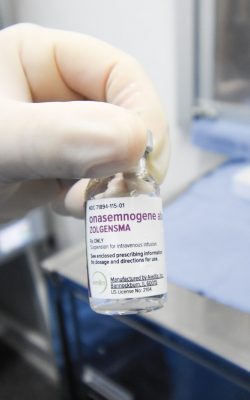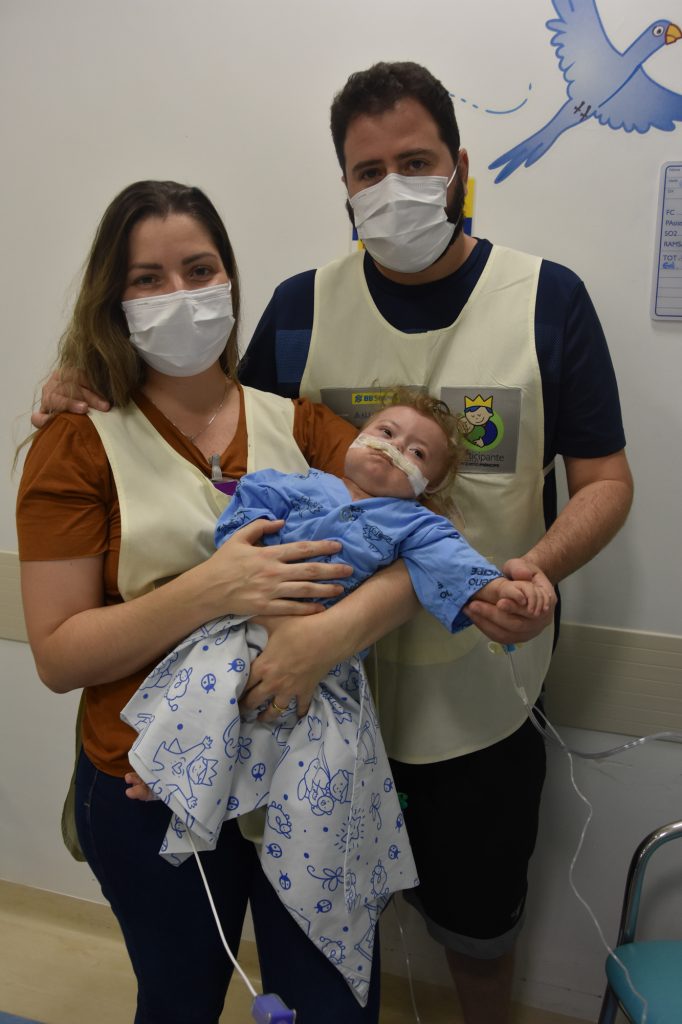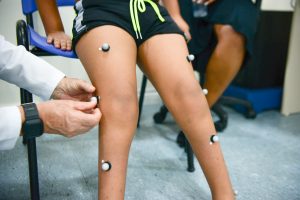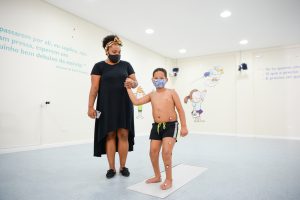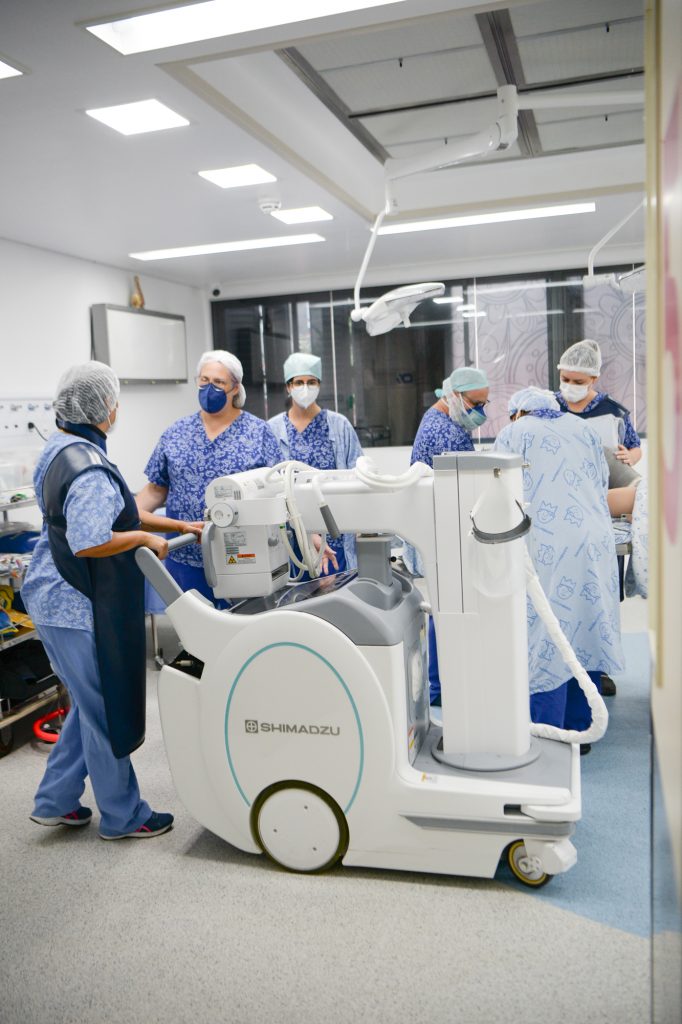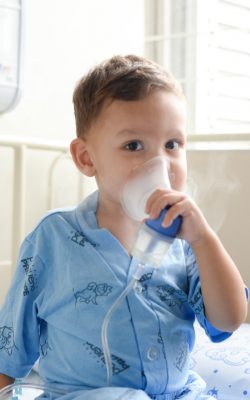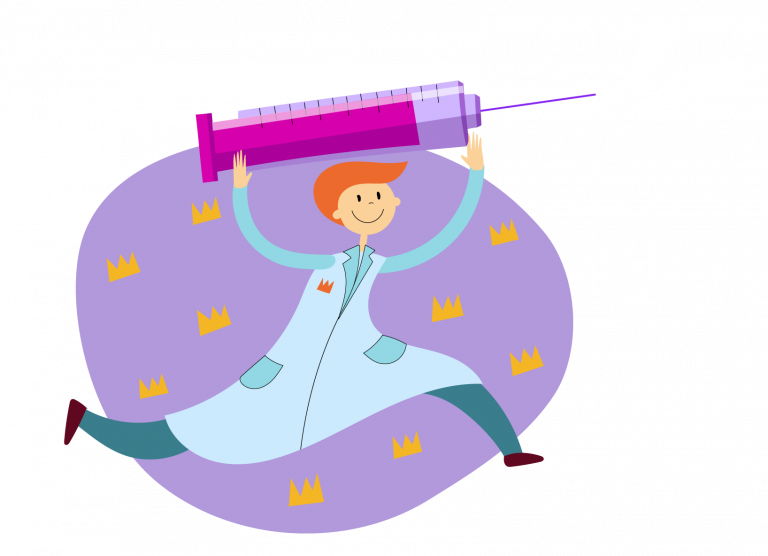
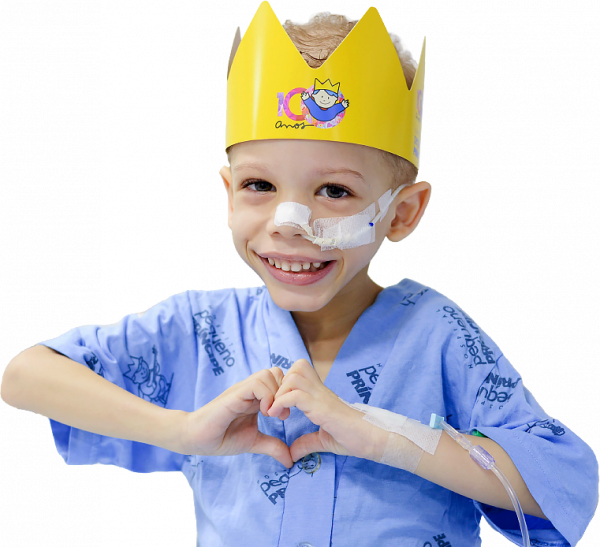
“When the vaccination campaigns were announced, the world breathed a sigh of relief.”
Audrey Azoulay,
director-general of the UNESCO
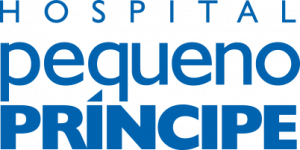
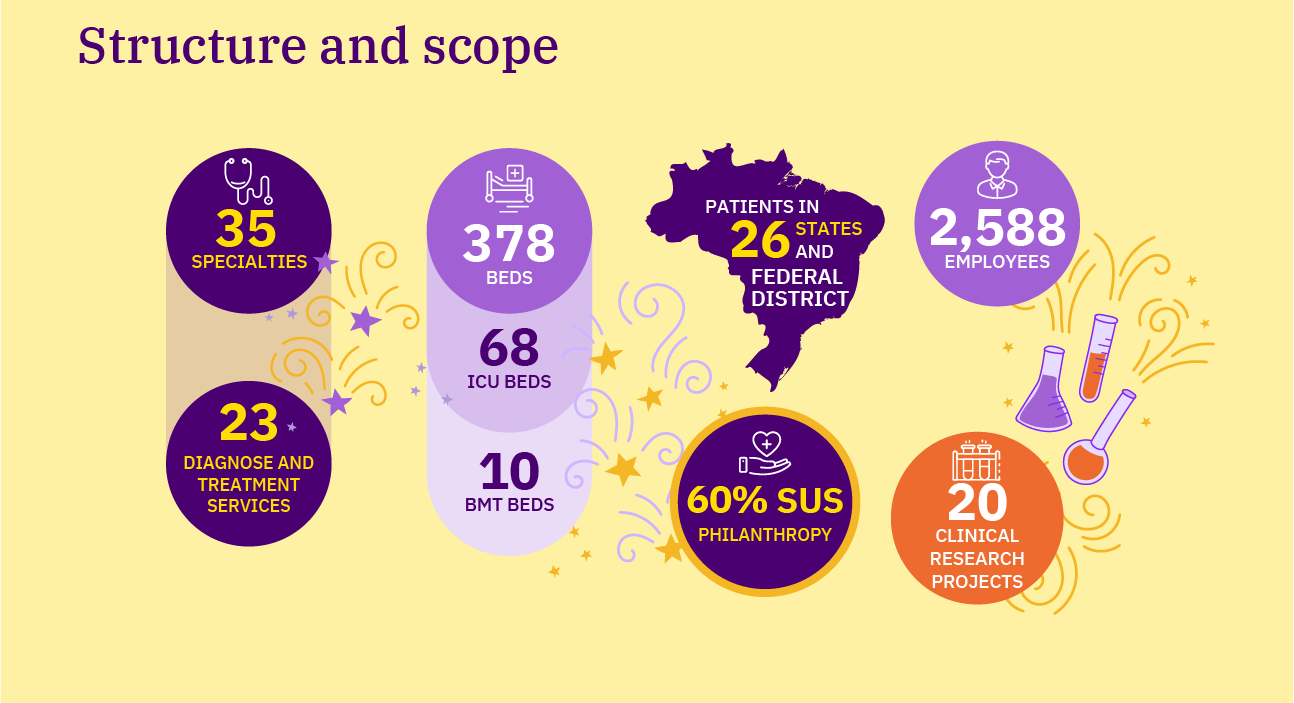
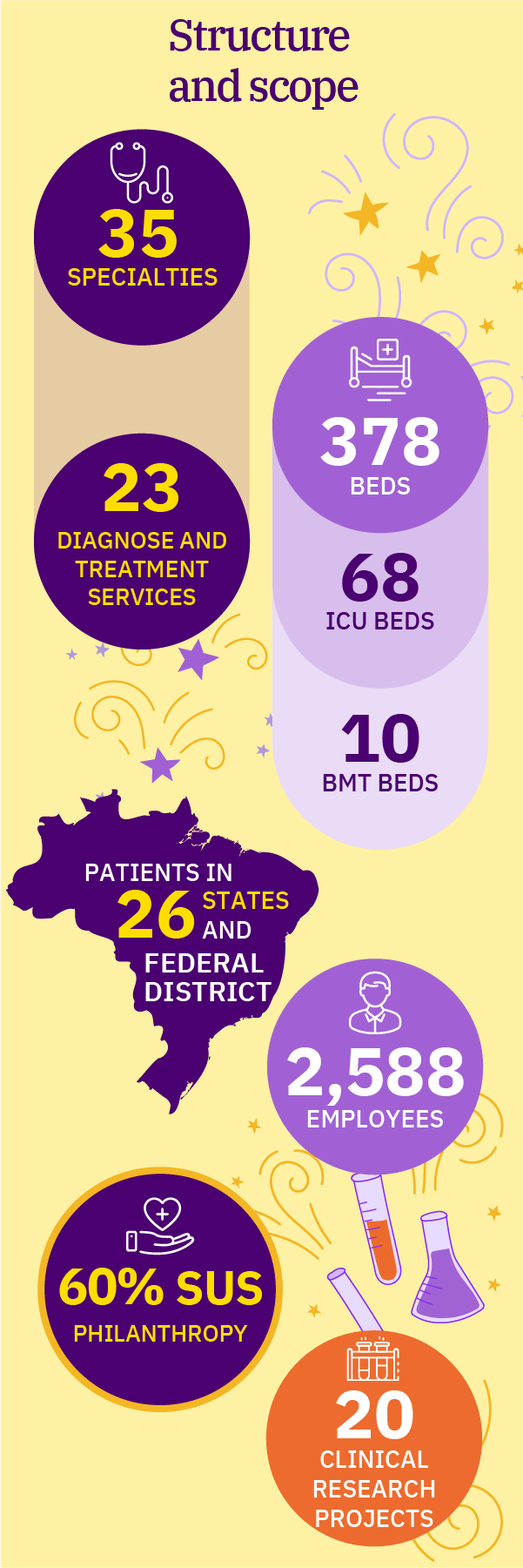
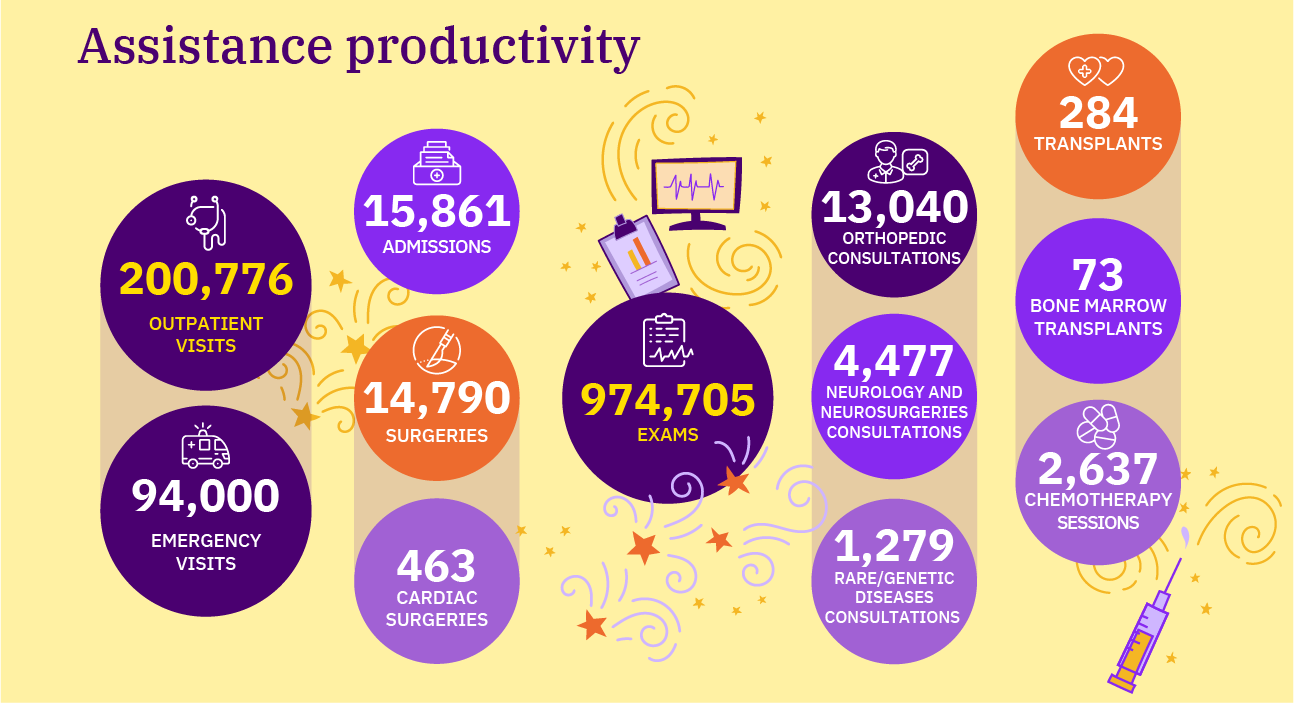
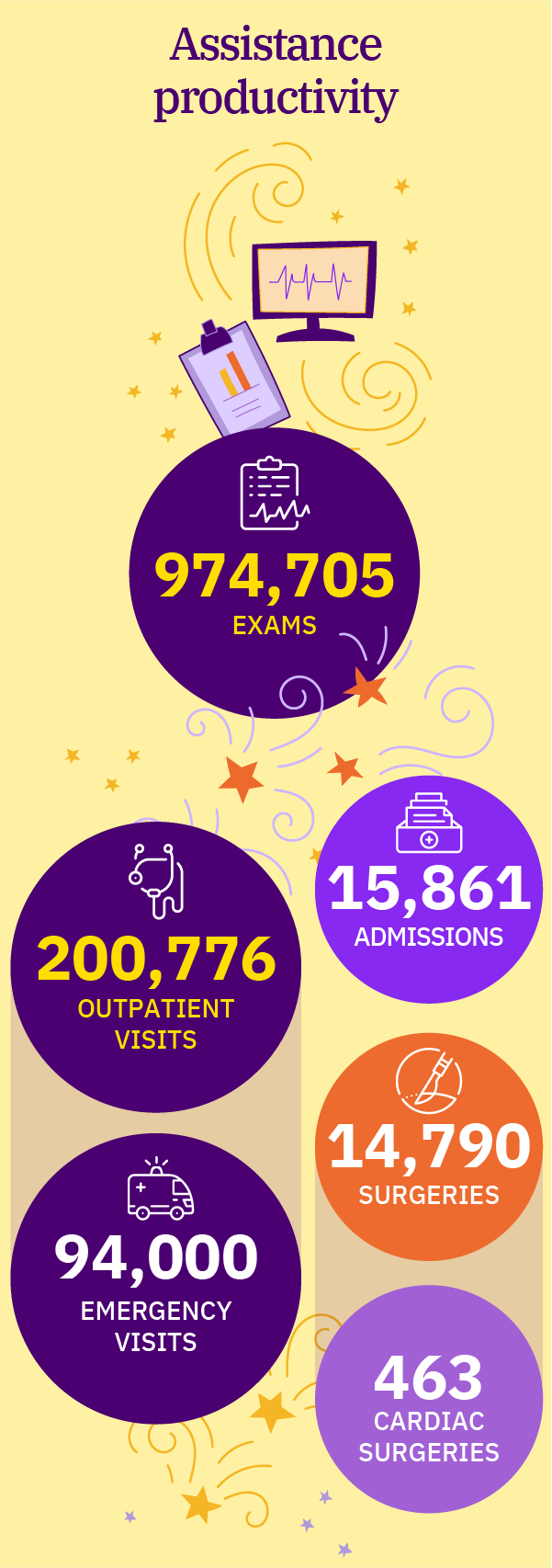
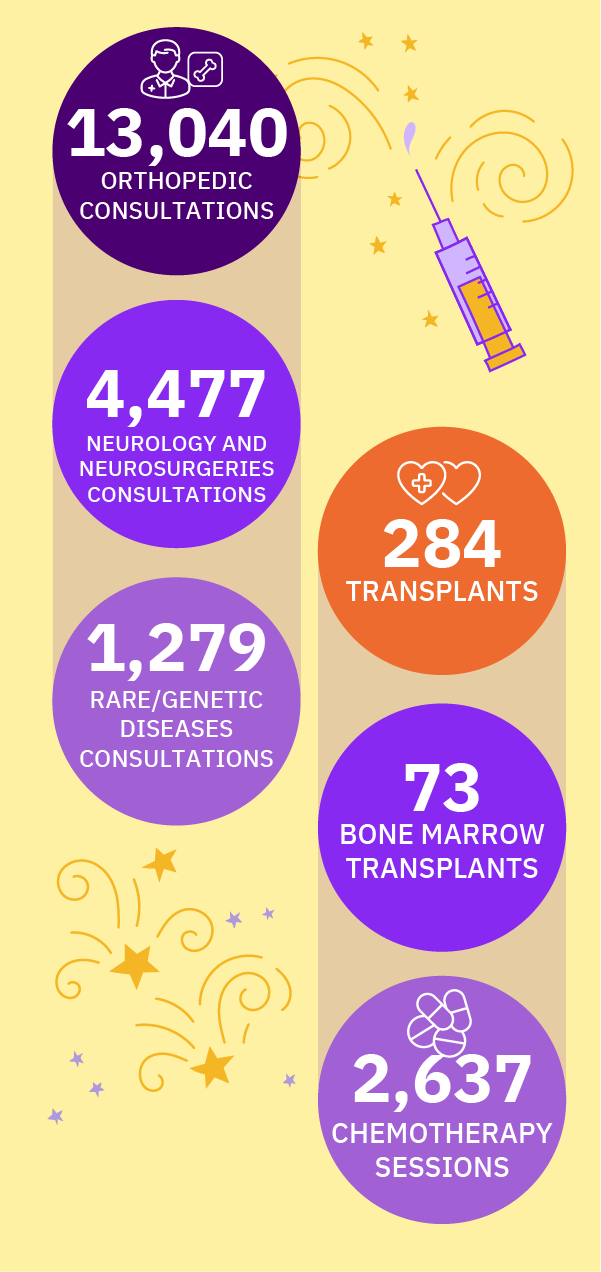
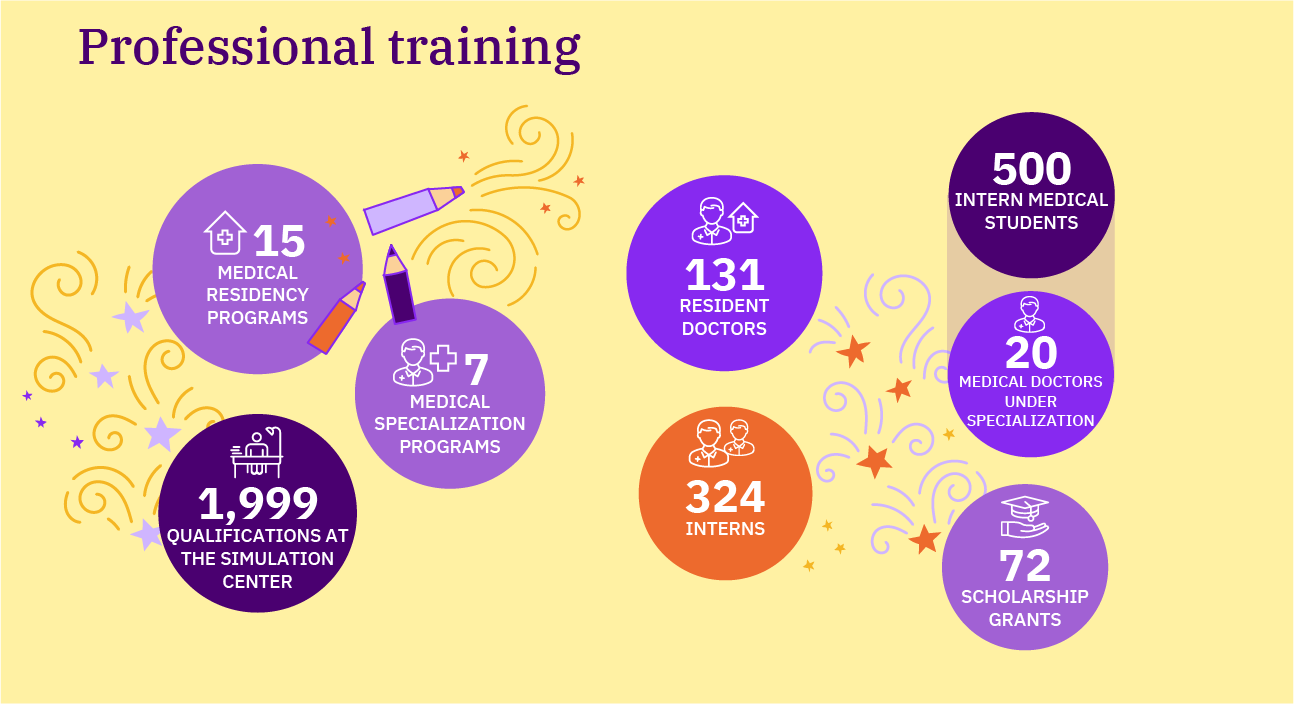
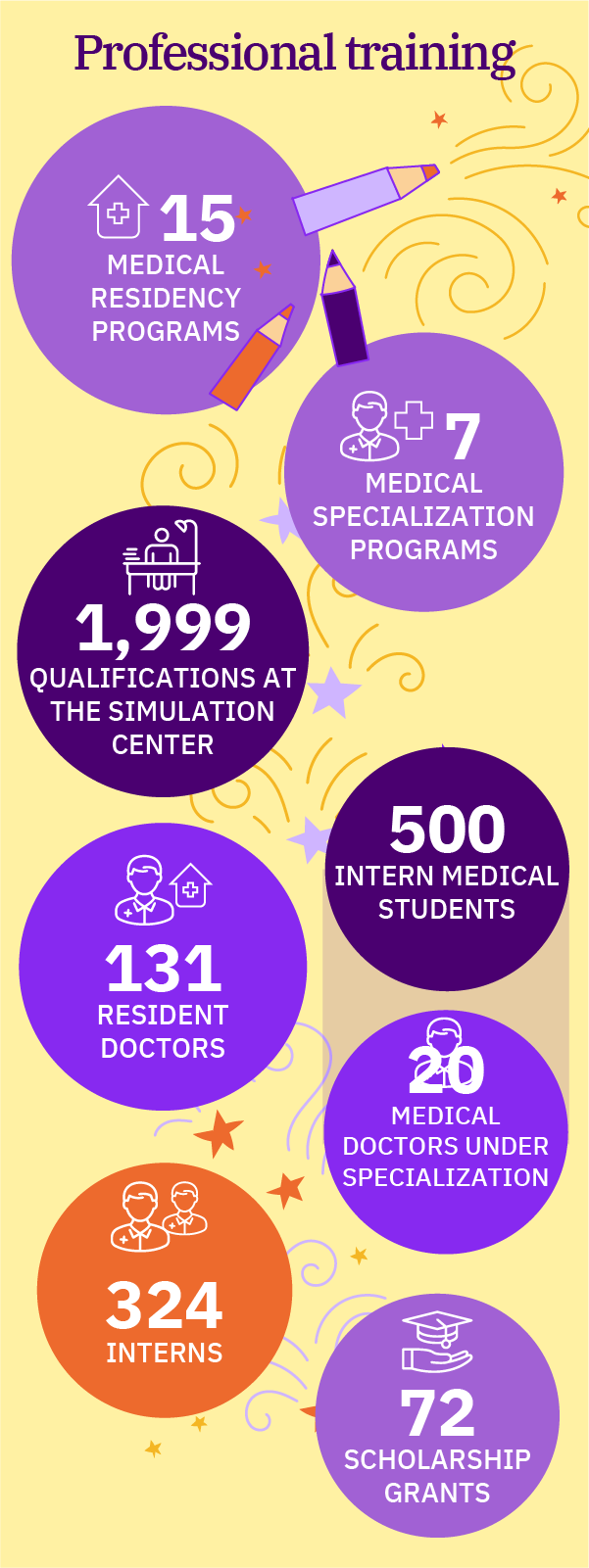
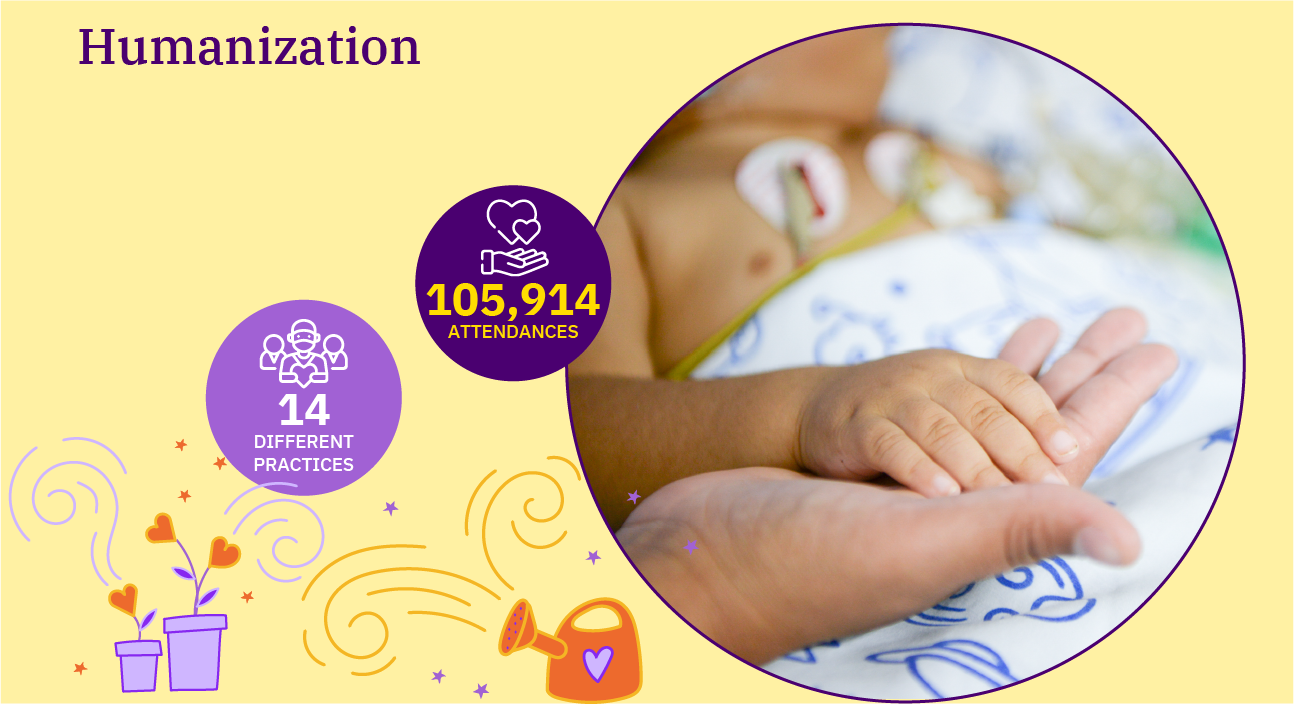
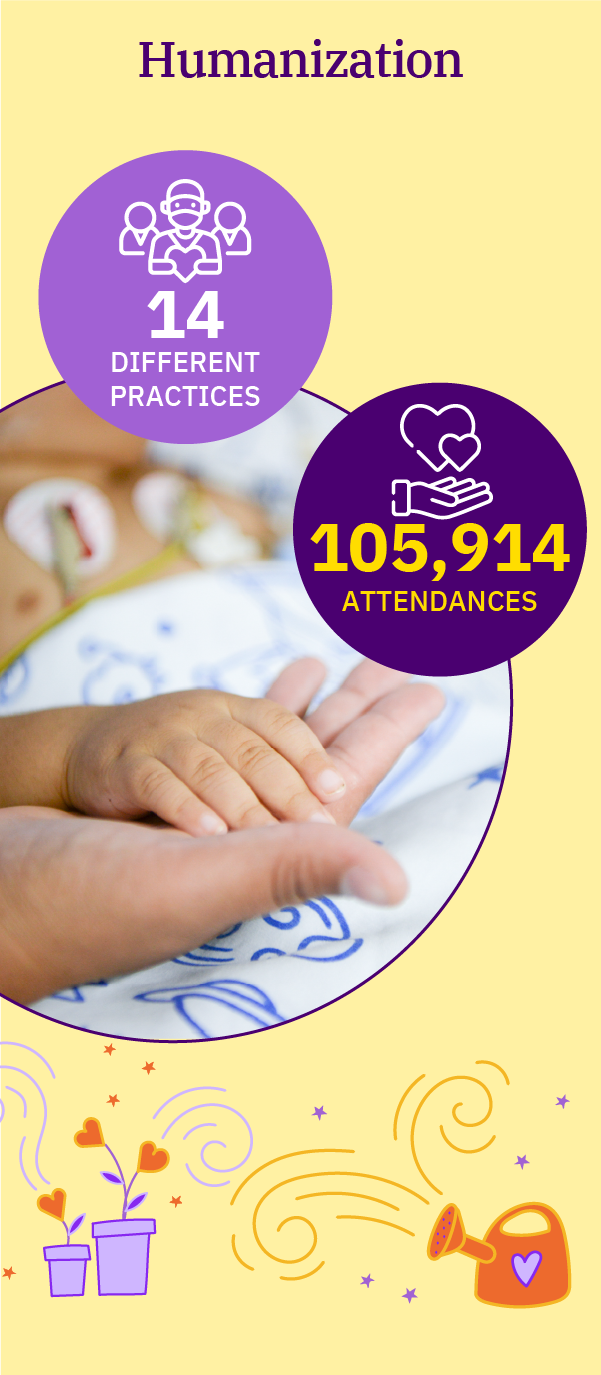

Evolution in times of crisis
The adaptations promoted by Pequeno Príncipe to deal with a long-term pandemic – and at the same time to maintain its activities in operation as much as possible – were essential to bring a result, in 2021, with an increase in the number of procedures (although still far from historical levels), especially of high complexity. The advance of vaccination was undoubtedly a stimulus for doctors, employees, and families of patients, but the learning from the beginning of COVID-19 was also relevant: the experience brought conditions to the Hospital to improve its operation even in an adverse scenario. From an economic and financial point of view, the year was extremely challenging, with a considerable increase in the assistance deficit.
Leading advancements in Pequeno Príncipe assistance
- Resumption of elective procedures: surgeries, admissions, and emergencies, which had a sharp drop in 2020 (respectively 40%, 43% and 54%), recovered ground and grew 21%, 26% and 58% in 2021 compared to the last year. However, they are far from the previous levels and the potential of the institution. The increases reflected two phenomena noted from the middle of the second half of the year, when the effects of mass vaccination against the coronavirus began to become evident: a greater sense of security for parents and guardians to take their children to a health service and perform electives surgeries, stalled since 2020 because of the pandemic.
| 2019 | 2020 | 2021 | |
|---|---|---|---|
| Surgeries | 20,402 | 12,233 | 14,790 |
| Admissions | 21,936 | 12,510 | 15,861 |
| Emergencies | 129,305 | 59,613 | 94,473 |
- Historic performance in high complexity: even being a pandemic year, in 2021 the Hospital reached a historic mark in the performance of transplants, with 284 procedures. There were 122 bone transplants, 73 bone marrow transplants, 18 kidney transplants, two heart transplants, 45 heart valves transplants and 24 liver transplants.
| Type of transplant | 2019 | 2020 | 2021 |
|---|---|---|---|
| Bone | 152 | 112 | 122 |
| Bone marrow | 62 | 61 | 73 |
| Renal | 14 | 13 | 18 |
| Heart | 2 | 3 | 2 |
| Heart valve | 44 | 43 | 45 |
| Hepatic | –* | 14 | 24 |
| Total | 274 | 246 | 284 |
*Liver transplants were suspended in 2019 to reorganize the service.
- Reversal of indicators impacted by the pandemic: the occupancy rate climbed from 54% in 2020 to 65% in 2021, an indication of approaching the annual average of 75% recorded before the pandemic. The average length of stay dropped from 6.06 days to 5.13, much closer to the 4.67 days recorded in 2019. The numbers reflect the resumption of the flow of elective patients, reducing the proportional weight of high complexity cases, which employ a smaller number of beds and require more recovery time than low and medium complexity procedures.
| 2019 | 2020 | 2021 | |
|---|---|---|---|
| Occupancy rate | 74.66% | 53.58% | 64.93% |
| Average length of stay | 4.67 days | 6.06 days | 5.13 days |
- Outpatient care for rare diseases: 1,279 consultations on rare diseases of genetic origin were carried out, up 52% compared to 2020. In relation to the year before the beginning of the pandemic, the growth is even greater: the number of outpatient visits of the specialty grew three times.
| 2019 | 2020 | 2021 | |
|---|---|---|---|
| Rare/genetic disease consultations | 418 | 841 | 1,279 |
- Measures to reinforce the safe flow of people: increased attention to COVID-19 prevention protocols. A professional specialized in occupational safety was hired to supervise and guide patients, companions and employees to respect the distance and correctly use of personal protective equipment.

The Hospital in the worst year of the pandemic
The second year of COVID-19 was significantly deadlier than the first. According to World Health Organization (WHO) records, 3.6 million people lost their lives in 2021 because of the disease, up from 1.88 million the year before. In Brazil, there were 425,000 deaths, more than double the 195,000 recorded in 2020.
Children, contrary to what people imagine, were not spared. Data from the Ministry of Health show that, in the age group of up to 11 years old, the country ended 2021 with at least 1,449 deaths due to the coronavirus – 2.5% of the total deaths caused by COVID-19 until then. Percentages like this have given rise to misunderstandings. To say that the disease is more fatal in adults and the elderly does not mean that it is less serious in children. The number of children killed by the virus as of mid-December 2021 was greater than that of all other diseases for which there is childhood vaccination – combined. It was the leading cause of death from illness among adolescents.
At Pequeno Príncipe Hospital, the data reveal how the situation in 2021 was more serious. Positive cases in patients and hospitalizations quadrupled. The number of deaths rose from five to ten, but the fatality rate was much lower in the last year.
The number of children killed by the virus as of mid-December 2021 was greater than that of all other diseases for which there is childhood vaccination – combined.
How did the Hospital manage to reduce the fatality rate?
- Discontinuation of ineffective drugs: the use of immunoglobulins – a type of protein that works as an antibody and had been recommended at the beginning of the pandemic – was suspended after no significant improvement was verified.
- Adoption of new drugs: tocilizumab is an example of a modern anti-inflammatory medication incorporated into the care of critically ill patients.
- Use of full-face masks: attached directly to a respirator, they promote lung ventilation and often avoid the need for intubation. The equipment was imported, as there was no model for children in Brazil.
- Bringing families closer: with the reinforcement of measures to prevent contagion, the Hospital decided to take parents and guardians inside the COVID-19 ICU. The initiative gave more peace of mind to both hospitalized patients and their families, helping to recover hospitalized children and adolescents.
A dangerous syndrome
Shortly after the initial outbreak of COVID-19, it was discovered that SARS-CoV-2 (the official name for the coronavirus) could cause a serious condition in children, the multisystem inflammatory syndrome in children (MIS-C). It compromises various organs of the body (such as lungs, heart, brain, kidneys, intestines and even the skin) and impairs blood circulation and heart capacity.
In two years of the pandemic, the Hospital treated 23 patients with MIS-C – eight in 2020 and 15 in 2021. The average length of stay was 31.6 days, including eight days in the ICU. As a result of complications caused by the syndrome, three patients died.
The team found that, of the 23 children seen, only six had comorbidities – that is, healthy children are also affected.
Post-COVID follow-up at the Cardiology Outpatient Clinic
Pequeno Príncipe detected that about half of children and adolescents infected with the coronavirus suffered cardiovascular changes. Even after recovering, many had sequelae in their hearts. To identify these cases early and treat them, the Hospital created a Post-COVID-19 Cardiology Outpatient Clinic.
In the clinic, patients undergo blood, imaging and holter tests (equipment that continuously monitors cardiac activity). The results help detect conditions such as myocarditis (inflammation of the heart muscle that can cause tissue death, observed in 30% of those hospitalized with COVID-19 in Pequeno Príncipe) and dilated cardiomyopathy (inflammation of the heart in which the organ is not pump enough blood; can progress to heart failure). Specialized treatment is essential to prevent problems that compromise quality of life even after the person is cured.
Outpatient follow-up continues to find out if the heart has been affected. There are patients who are initially asymptomatic from a cardiac point of view, but who later develop arrhythmia. When a problem is confirmed, early therapeutic interventions make all the difference.
The mapping of the COVID-19 Observatory
To have a complete perspective of the impact of SARS-CoV-2 on the institution, Pequeno Príncipe maintains the COVID-19 Observatory. The tool, launched at the beginning of the health crisis, continues to be periodically fed by all sectors of the Hospital, the Research Institute, and the College.
In addition to data on the disease (such as the number of cases, tests, visits, and deaths), the absence of employees, the protection items made available, the amount collected with donations and the expenditure on medicines and equipment, among other indicators, are recorded. Analyzed together and by period, they work like a detailed map of COVID-19 in the Complex. The tool reveals, for example, the jump in infections from one year to another in patients of different ages.
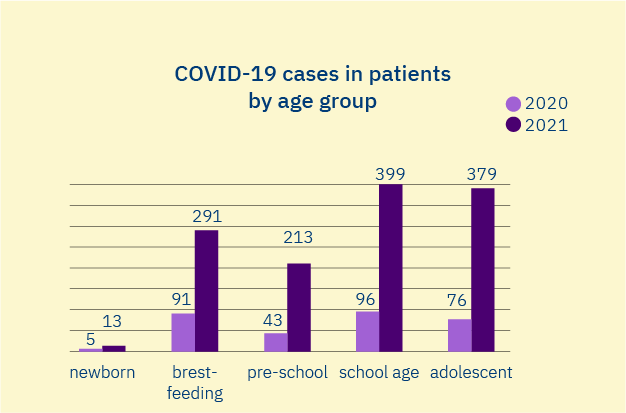
Attention to employees: vaccination and care
To protect the health of the thousands of patients seen every year at Pequeno Príncipe, the Hospital’s professionals also need to be healthy. This has become an even greater priority in times of COVID-19. Paraná ended 2021 with 1.59 million confirmed cases, about 300,000 in Curitiba alone (16% of the population). The health of employees was prioritized on several fronts. See below.
- Vaccination: as soon as the vaccine was made available, in January, professionals began to have it administered. Emphatically supported by Pequeno Príncipe, immunization followed the order determined by the authorities. Frontline professionals in the fight against COVID-19 were given priority; then came the employees from the other sectors of the Hospital, until they reached the rest of the Complex and those who were working from home. The timeline of vaccination shows the reduction of infections. In the last quarter, Pequeno Príncipe went 37 days without registering new cases. The numbers only rose a little again at the end of December, after the outbreak of the highly contagious omicron variant began.
- Continuity of exclusive service: the Hospital maintained the COVID-19 Strategic Outpatient Clinic, exclusively dedicated to the service and testing of employees. The structure welcomes professionals with suspected contamination and quickly forwards exams to diagnose the disease. The tests, including RT-PCR (more accurate), are performed by the Clinical Analysis Laboratory and by the Pequeno Príncipe Genomic Laboratory, and the results are available in less than 24 hours. This helped to decrease the absenteeism rate (the ratio of total absences or delays to the number of hours worked by employees).
Even so, because of the high spread of the coronavirus, the equivalent of 11,019 days of certificates were issued for suspected contagion. The figures from the Strategic Outpatient Clinic also show that there were more than 3,000 visits from employees suspected of having the disease, which resulted in almost 3,000 tests and 440 positive cases.
- Prevention equipment: The Hospital’s PPE Distribution Center made new personal protective equipment available daily to protect employees from COVID-19. More than 40,200 items were distributed.
- Attention to risk groups: clinical reassessments were conducted on about 60 employees at greater risk of complications in case of infection by the coronavirus, such as the elderly and pregnant women. Cases confirmed as belonging to risk groups had extended sick leave. Preventive leave was granted to 51 pregnant women, and all lactating women continued to receive six-month maternity leave.
- Psychological monitoring and stress reduction: face-to-face psychology and nutrition consultations and physical activities of the Cores Program (control and reduction of stress) began to be resumed in the second half of 2021, after the drop in COVID-19 cases in the institution. Massage therapy sessions, reiki and auriculotherapy were among the authorized activities. Psychological and nutritional care more than doubled compared to the previous year, reflecting the need for professionals at the Complex to take better care of themselves in view of the extension of the pandemic period. There were 679 psychological and 362 nutritional guidelines.


Strengthened care with humanization
More than 80% of Pequeno Príncipe’s patients are under 12 years old, and about 58% are in Early Childhood. To take diligent care of children’s health and lessen the concern of their families, care needs to be increasingly humanized – an emphasis that the Hospital made a point of maintaining even in the most acute phases of the pandemic. COVID-19, of course, was a challenge: it required the suspension of some programs and the adaptation of others. It was also an opportunity for the humanization area to realize what could not be left out and what needed to be reinforced, especially in 2021, when the negative effects of prolonged restrictions became more evident.
Family always around
The Participating Family Program was maintained even with the limitations of the pandemic. It has been in operation since the 1980s and has already guaranteed accommodation, food and hygiene items to thousands of parents or guardians unable to stay in Curitiba during the period of their children’s hospitalization.
The distance between adults and patients in the ICU was adopted at the beginning of the health crisis, in March 2020, following the guidelines of the health authorities. But quickly the perception that having someone in the family close by was essential to accelerate recovery led to an adaptation to the psychological and affective needs of children and adolescents: the presence of one companion per patient in the ICU was authorized. The rule was maintained in 2021, with attention to health and safety protocols.
More hospitality for those in need
There was social isolation for several months, there was fear in the face of the unknown, there was a slowdown in the economy. But, without a doubt, the most devastating effect of the pandemic was the loss of loved ones. The Pequeno Príncipe dedicated even more care to these sad cases and moments. Thus, the conversation and reception circles for bereaved families were born, which began to be held in September, once a month. In them, grieving family members can share feelings and experiences, hear the opinion of Hospital experts, and feel more welcomed while facing the loss of those they loved so much.
The initiative also provides families with a “trousseau” with messages of comfort and a memory box with small souvenirs to help with the grieving process.
The most devastating effect of the pandemic was the loss of loved ones.
Listening for the benefit of the organizational climate
The humanization circles, a space for listening to employees, were resumed in 2021 after being suspended the previous year because of the pandemic. Participation was limited to a maximum of two professionals from each shift or sector of the Hospital, in order to reduce the flow of people and thus prevent contamination by COVID-19.
The resumption was important to advance in the launch of the chapters of the Pequeno Príncipe Code of Conduct, which brings together guidelines for employees, basic standards of care and strategies for resolving conflicts, content that was constructed collectively.
Evolution of the Very Early Childhood project
The Very Early Childhood (gestation at 3 years of age) is crucial for the development of children, as it is the period in which human beings have greater brain malleability. The experiences and stimuli of this phase influence the rest of life, hence the importance of simple but incredibly careful attitudes to support children’s development. Created in 2014 by Pequeno Príncipe, the Very Early Childhood project trains caregivers to deal with this age group following the best pedagogical practices: knowing how they play, what they eat and how they should be treated, for example. The qualification of educators took shape in 2021, with training in music therapy. Children who are agitated or who do not respond to other stimuli are constantly interested in music, which makes therapy an ally in learning and a great tool for unlocking communication.
Integrative practices for residents
Recognized for offering qualified technical-scientific training, Pequeno Príncipe’s medical residency programs attract professionals from all over Brazil – and even from other countries. The Hospital, considered by the Ministry of Education as a Teaching Hospital since 1972, is one of the main national training centers for pediatricians and other professionals specialized in children’s health.
With decades of experience, the area’s coordination identified changes in the mental health of residents during the pandemic, which led the Humanization Sector to develop, in 2021, the Program of Integrative Practices for Residents. The initial focus of the program, which starts operating in 2022, is to expand attention to young professionals to reduce stress levels and increase quality of life.
Resumption of face-to-face education
Education is also a constitutional right for children and adolescents hospitalized for treatment. School monitoring conducted by teachers from the public network, suspended at the beginning of the pandemic and restarted in the same year voluntarily by teachers with the help of digital media, was expanded in early 2021 after the municipal and state secretariats of Education made distance learning official. The Hospital located the patients who were unattended and put the families in contact with the teachers. In June, face-to-face teaching with individualized service, a tradition of Pequeno Príncipe, was fully resumed.
Pequeno Príncipe is one of the main national training centers for pediatricians and other professionals specialized in children’s health.
Adapted cultural activities
Messaging and video calling applications and social networks were used to adapt the Pequeno Príncipe cultural activities in 2020, and their use was consolidated in 2021. The contact of patients and families with artistic expressions continued in different programs. Check it out below.
- Weekly readings of works and video storytelling.
- Virtual Book Club, which distributed works in digital format made available by publishers.
- Movie session, with animations and short films sent to familiess.
- Presentations in the internal courtyard and in the external area of the Hospital, seen by the patients from the windows.
- Delivery of kits for conducting cultural activities in the rooms and at home.
In the middle of the year, in-person service at the library was released on a limited basis, with a maximum of two patients at a time – the loan of physical books, made with the help of volunteers who visit the Hospital, was maintained from January to December.
Volunteering in action
The engagement of volunteers at Pequeno Príncipe is a centuries-old tradition – it is at the root of the institution itself. In recreational activities and cultural events, they bring games and fun to patients and families, increasing the optimism of health professionals.
In the second year of the pandemic, the teams of volunteers did not grow, as interviews and training remained suspended to avoid contagion by the coronavirus. But the work continued: the subscribers conducted activities remotely and distributed thousands of donated items, such as toys. One of the actions took place in the Jovem Abraça Criança Program, in partnership with Colégio Positivo, in Curitiba. School students recorded videos in which they tell stories from the book “No Reino da Araucarilândia”, written by the corporate director of the Pequeno Príncipe Complex, José Álvaro da Silva Carneiro. Videos were shared with patients through QR codes.
Maximum quality acknowledged once again
The technical-scientific efficiency and excellence in humanized care in all sectors of Pequeno Príncipe were confirmed for the third year in a row. The National Accreditation Organization (ONA), the main certifier of the quality of hospitals in Brazil, maintained the classification of level 3 – the highest level.
As in 2020, in 2021 the assessment was remote. Through an online platform and telepresence robot, over two days (April 15th and 16th), the evaluators learned about results, attested to improvements in work processes, had access to indicators and observed compliance with protocols and safety goals, in addition to actions to combat COVID-19. The analysis was already done under the new ONA manual (version 2022–2025).


Consolidated and expanded telemedicine
Telemedicine has been recognized by the World Health Organization since the 1990s, but it only really gained momentum during the social isolation imposed by COVID-19. Through information technologies and artificial intelligence, it makes it possible to make consultations, check symptoms, perform exams, arrive at diagnoses, and prescribe medicines electronically, at a distance, in a safe and effective way.
Pequeno Príncipe started using this instrument in 2016, in partnership with institutions abroad. The experience-sharing program with Children’s National Hospital in Washington, D.C., continues to this day. In 2020, the Hospital implemented teleconsultations, still on a pilot basis. In 2021, consolidation came, with the creation of the Hospital’s Telehealth Service. Teleservices were most used in the anesthesiology specialty (72.5% of consultations were remote), but they also had a relevant participation in clinical neurology (23.7%), immunology (17%), rare diseases (13.5%) and gastroenterology (12.2%).
In 2021, consolidation of telemedicine came, with the creation of the Hospital’s Telehealth Service.
How did the Pequeno Príncipe advance in telemedicine?
- Development of a guide for professionals: the Hospital developed a specific protocol and defined its telepropaedeutics guidelines, subject to the ethical principles recommended by the WHO and the rules of the Federal Council of Medicine. Pequeno Príncipe only uses tools that respect patient autonomy and privacy and store information securely. The material was released in 2022.
- Technology available to everyone: the first to benefit from telemedicine in Pequeno Príncipe were SUS patients who were already undergoing treatment at outpatient clinics. For this group, which has the most difficulty in accessing healthcare, in February teleconsultations were made available in 13 specialties. In June, private teleconsultations were released.
- Inclusive care for Indigenous children and adolescents: teleconsultations is part of the Kakané Porã project, which provides healthcare to children from the urban Indigenous Kakané Porã village in the Southern region of Curitiba. To overcome the difficulty of fathers and mothers taking their children to a health unit, the TytoCare device was made available. The handheld device measures temperature, monitors heart rate, captures sound from the abdomen, allows for ear exams, takes high-definition images of the throat, and transmits everything to doctors. He arrived in Brazil through Tuinda, a startup accelerated by Pequeno Príncipe, Sabará Children’s Hospital (São Paulo) and Pensi Institute.
The good fruits of the Kakané Porã project
Kakané Porã is the first urban village in Southern Brazil. It was created in 2008 in the Campo de Santana neighborhood, in the extreme south of Curitiba, to bring together Indigenous people from the Guarani and Caingangue ethnic groups from Rio Grande do Sul and the Paraná state inland. Its name, originated from the combination of words from the languages of the two peoples, means “Good Fruit”.
The Kakané Porã project started in July 2021, with face-to-face meetings. A multiprofessional team from Pequeno Príncipe conducted screening and consultations with children and adolescents in the village, referring those who needed further tests or specialized care to the Hospital. The initiative included reading workshops conducted by the Education and Culture Sector, conversation circles promoted by the Humanization Sector and the Psychology Service, and Volunteering activities.
Telemedicine gave another dimension to the work, as it allowed for the continuity of care even without the physical presence of the Pequeno Príncipe professionals. “TytoCare is a new experience, I never imagined collaborating with it. It is a device that does everything completely, even if the consultation is at a distance,” says the nursing technician Indianara Morais Veloso, a resident of the village and that is the point of contact between the Hospital and the community.
Neonatal ICU: 30 years saving lives
A national reference in the care of newborns who need intensive care, the Pequeno Príncipe Neonatal ICU completed 30 years in 2021. In these three decades, the unit has helped to keep more than 8,000 premature babies alive – thousands of lives, of dreams and affections that could be continued thanks to the work of multi-professional teams and state-of-the-art equipment.
In the 20 beds of the ICU, prepared to care for and treat babies with complex diseases or malformations, more than one hundred professionals work – doctors, nurses, psychologists, speech therapists, physiotherapists, pharmacists, nutritionists, and social workers.
In the year of its 30th anniversary, the Neonatal ICU started to receive newborns with cardiological alterations previously treated in the Cardiology ICU. As a result, cardiologists travel to the Neonatal ICU to monitor the process. The new protocol benefits babies, who receive all the necessary care in the same unit, and frees up more beds in the Cardiology ICU, which can even perform more surgeries in the same period.
A victorious story
The professionals who work in the Neonatal ICU of Pequeno Príncipe collect exciting stories. In 2021, the case of little Vitória Dalbosco, from Chapecó (located in Santa Catarina state), was one of the most touching. Her parents, Inocência and Marco Aurélio, had lost their first child, who was just over 36 hours old, although the pregnancy and delivery went without complications. Doctors suspected a genetic condition and recommended intrauterine tests when Inocência became pregnant with Vitória.
The tests on Pequeno Príncipe confirmed the hypothesis: the girl had argininosuccinic aciduria, a rare disease that causes ammonia to accumulate in the blood and causes bleeding. Liver transplantation is one of the recommended treatments, but the parents could not be donors because of the genetic condition, and Vitória would need to gain weight and be older. The family found in Pequeno Príncipe the network of attention it needed. “On the day of delivery, a battalion of professionals was mobilized to, within a maximum period of one hour, Vitória leave my belly and arrive at the Neonatal ICU of Pequeno Príncipe,” recalls the mother. Vitória arrived at the unit in 20 minutes.
After undergoing dialysis and blood transfusion, she began to be fed a formula imported from Germany, which costs about US$ 300 for a 500-gram can. She grew up, gained weight and at 7-months-old she entered the transplant waiting list. A compatible liver appeared within two months, and the surgery was performed. The 15 days of post-transplantation in the Neonatal ICU were filled with anguish and hope for the family, but Vitória lived up to her name. “Today she is completely cured, without any sequelae, eating everything, developing and gaining weight,” says Inocência. “Victoria is alive, and I have a lot to thank to Pequeno Príncipe Hospital.”
Pacient Vitória Dalbosco
Greater security to prevent infections
ICUs often need to use invasive devices that help sustain life, but that can cause infections. To improve patient safety, Pequeno Príncipe joined a project of the Institutional Development Support Program of the Public Health System (PROADI-SUS), which involves the participation of 204 hospitals in the country.
The project is the Health in Our Hands: Improving Patient Safety on a Large Scale in Brazil, which since September 2021 has provided technical and methodological support in a collaborative way – everyone teaches and everyone learns the best practices to control, for example, infections caused by the introduction of catheters into the body. The Pequeno Príncipe is part of the Moinhos de Vento Hospital hub, in Porto Alegre.
Among the improvements already put into practice in the ICUs after joining the PROADI-SUS are the increase in the period of use of ventilators for breathing – through equipment that at the same time heats and humidifies the circuit traversed by the air –, new hygiene techniques and reinforcement of communication, through posters with guidelines for the teams.
Transplants: new life for children and adolescents
More than correcting a health problem, transplants represent a new chance of life for each little patient who undergoes this type of procedure. They are among the most delicate surgeries, requiring extra care and specialized techniques when performed on children and adolescents.
The Pequeno Príncipe had a memorable performance in 2021 by performing 284 transplants, a record in the centenary history of the institution. Three classes of transplants stood out, with better results even than in the pre-pandemic period. Check it out below.
- Bone marrow transplantation: the Bone Marrow Transplantation Service (BMT) celebrated its tenth anniversary in 2021, when the Hospital performed 73 procedures (11 more than in 2019). One of them in a 1 year and 5-month-old child who came from Mato Grosso state with adrenoleukodystrophy, a rare genetic disease that affects the part of the neurons responsible for conducting electrical signals and makes it difficult to speak, swallow and walk, for example. It was the earliest bone marrow transplant for this disease ever performed in Brazil. The cases of young children have become a specialty of the BMT Service: in its ten years, 26% of the surgeries were in patients up to 3 years of age.
- Kidney transplant: performed at the Hospital since 1989, this type of transplant reached the mark of 18 procedures per year (14 in 2019 and 13 in 2020). Some were recommended even before the children were born, thanks to prenatal checkups. This is the case of the girl Luísa da Silva, from Goiânia (state of Goiás), capital where no hospital performs kidney transplants. Referred to Pequeno Príncipe, she underwent the procedure at 9 months of age.
- Liver transplantation: the service restarted in 2020, after a period of reorganization. The 24 procedures performed in 2021 far surpassed those of the previous year (14) and reached a survival rate of 97%, raising the percentage of 93% in the first 12 months of recovery. Pequeno Príncipe has established itself as the only institution in Paraná to perform the procedure in children under 10 years of age.
Even facing the COVID-19 pandemic, Pequeno Príncipe managed to reach a historic mark in the performance of transplants. There were 284 procedures performed in the year.


Gene therapies to treat rare diseases
Genomic medicine is revolutionizing the diagnosis and treatment of especially rare and chronic diseases. Despite the name, rare conditions cannot be overlooked: the WHO estimates that 13 million Brazilians and more than 300 million people in the world suffer from diseases of this type.
At Pequeno Príncipe, the Outpatient Clinic for Rare Diseases conducts consultations, exams, and genetic counseling to detect and treat them. The main initiatives of 2021 were:
- Brazil Genomes Project: launched in 2020 by the Ministry of Health to conduct the genetic sequencing of patients with rare diseases. Pequeno Príncipe has made an average of 20 exam requests per month. Genetic mapping is a lengthy process, and the Hospital began to receive the first results in December 2021. With the genome available, experts were already able to indicate whether or not patients would benefit from a transplant, for example. The project is a partnership with Hospital Israelita Albert Einstein, in São Paulo.
- Raras Project: epidemiological study to find out the number and profile of patients with the most frequent rare diseases in Brazil. Funding comes from the National Council for Scientific and Technological Development (CNPq, abbreviation in Portuguese) and the Ministry of Health. Pequeno Príncipe provides data and indicates cases to researchers from the University of São Paulo (USP) who participate in the project, helping to map the local and national scenario.
- Training of professionals from the public service: at the invitation of the United Nations Children’s Fund (UNICEF), specialists from the Hospital organized a course on rare diseases, aimed at professionals from basic health units in Brazilian states with a low Human Development Index (HDI). They learned to detect early signs of rare diseases. The initiative was sponsored by pharmaceutical Roche.
- Access to the most expensive drug in the world: after offering gene therapy to patients with spinal muscular atrophy for the first time in Brazil for free in 2020, Pequeno Príncipe began the largest experience in the country with Zolgensma, known as the most expensive drug available (US$ 2.1 million a single dose). The drug inserts the missing gene into the patient with the disease, and this gene produces a protein essential for the survival of motor neurons, which guarantees strength gains and improved motor skills. The Hospital has already applied Zolgensma to 13 children, at no cost to their families, through a manufacturer program, fundraising campaigns, or court rulings – there were 12 cases in 2020 and one in 2021.
Evolution of care practices
Enhanced use of ECMO technology
Extracorporeal membrane oxygenation (ECMO) therapy temporarily replaces the heart and lungs functions in patients who need to spare these organs – increasing the chances of survival by up to 50%. It began to be applied in Pequeno Príncipe in 2021, and the rules were revised and improved in the same year, in order to further increase the quality of treatment, used in circumstances of heart failure after heart surgery, but also in cases of failure cardiopulmonary related to infections or refractory lung disease.
The Hospital approved specific rules for the application of the therapy, with a detailed description of the cases in which it is most recommended. It also implemented an innovative protocol, whereby nurses trained in ECMO adjust medications according to the patients’ evolution based on previously discussed goals and formalized in a protocol by the team that is part of the program (ECMO team).
Another important change was the creation of a collegiate formed by five specialists, who always make the most important decisions together – an additional strategy to ensure that each case receives the maximum care, and that technology is used in the best viable way.
Based on high-cost technology, made possible with resources from judicial fines resulting from actions by the Public Labor Ministry, the program treated three patients in its initial year. Joaquim Pereira Vizoni, from Santa Catarina state, was the first successful clinical outcome at 5 months of age. After undergoing complex heart surgery and a satisfactory postoperative period, the baby was diagnosed with sepsis (widespread infection) and was unresponsive to conventional treatment. After collegiate discussion, Joaquim was placed on ECMO before more advanced stages of deterioration occurred. After five days, little Joaquim recovered, stabilized, and assumed the ability of organs to function without the support of the device. After the device was removed (decannulation), he was rehabilitated and managed to leave the ICU, returning to being breastfed and strengthening the interaction with the parents.
Creation of the Gait Laboratory
The opening of the Computerized Gait Laboratory reinforced the role of Pequeno Príncipe Hospital in pediatric orthopedics. The center is equipped with devices capable of quantifying movement, identifying deformities, and measuring lower limb muscle strength. Such measurements generate valuable information to support diagnoses and more opportunities for the treatment of motor difficulties.
The Computerized Gait Laboratory is the only one of its kind in Paraná intended for clinical evaluations of patients with mobility problems. It begins to serve in 2022, associated with a virtual reality rehabilitation room, whose main advantage is to increase the involvement of people in rehabilitation with therapeutic activities, thanks to the playful use of electronic games.
The laboratory and the rehabilitation room are projects of the Rehabilitation and Co-living Center of Pequeno Príncipe (Appam Program) and were made possible with resources from the National Program to Support Healthcare for People with Disabilities (Pronas/PcD) and tax incentives granted to companies.
Reduced postoperative period in spinal arthrodesis
A complex and long-term procedure, spinal arthrodesis is a surgery to treat conditions that cause instability, such as deformed vertebrae, fractures and even tumors. With the objective of reducing the variability of care in assistance, Pequeno Príncipe developed in 2020 the Spinal Arthrodesis Care Line, as part of a program of multiprofessional systematization of assistance in clinical and surgical conditions.
This systematization included the preparation of patient and family expectations, immediate and managed mobilization, and pain monitoring and control, among other actions. The centrality of care for the patient and family is present through the active participation of the patient and their families, who follow the information given by professionals through the use of the Arthrodesis Diary.
In this specific protocol, the immediate mobilization and at different moments in the postoperative period was systematized and managed through indicators, with a significant increase in adherence. Postoperative pain control was amplified in 2021 through greater family participation and autonomy in recording their pain scale.
The changes provided excellent results: the postoperative stay dropped to four days, on average. There were 41 patients who underwent the procedure in the year, most of them teenagers.
Advancements in antimicrobial control
The Pequeno Príncipe’s stewardship model for the use of antimicrobials, created to promote the judicious use of these drugs, that end up increasing the resistance of certain bacteria, has been proven to be effective against infections caused by Staphylococcus aureus. The microorganism is common in the body, but in extreme cases it can cause generalized infection (sepsis), pneumonia and heart infections.
The Pequeno Príncipe methodology to rationalize the use of antimicrobials is directed by the clinical pharmacy, using a multiprofessional approach: it involves infectious disease specialist, assistant doctors, microbiologists, nurses, and nursing technicians in the preparation of drugs, all around the discussion of the most effective form of this use. By 2020, the model had been taken to four other institutions (Hospital das Clínicas da USP, in São Paulo, state of São Paulo; Hospital Universitário de Sergipe, in Aracaju, state of Sergipe; Hospital do Trabalhador, in Curitiba, state of Paraná; and Hospital Ministro Costa Cavalcanti, in Foz do Iguaçu, also in Paraná state). In 2021, added resources were approved by the pharmaceutical company Pfizer, sponsor of the initiative, which will make it possible to take the work model to ten other neonatal and/or pediatric ICUs in Brazil.
Event monitoring for incident prevention
The Hospital expanded the monitoring of events that may pose a risk to patients and improved its reporting model. A computerized system developed in April 2021 allows managers to report and monitor adverse situations, such as problems in transferring children or adolescents between different wards.
The use of cameras in intensive care units, which began in 2020 by the Cardiology ICU, has expanded. The devices help improve compliance with hygiene protocols and provide more patient safety. Access to images is restricted, and their storage follows all the provisions of the Brazilian General Data Protection Law (LGPD, abbreviation in Portuguese).
Renovations and new equipment
Even in the worst year of the COVID-19 pandemic, with all the limitations and adversities of the period, Pequeno Príncipe carried out works of great importance for the institution, patients and their families.
- New SUS Emergency Room: the sector was renovated, gaining more space and new offices. The waiting room, the observation bed area and the bathrooms also underwent readjustment. After the reopening, which took place in June, children, adolescents, and companions have more privacy and comfort. The work lasted six months and cost US$ 300,000. Most of the resources collected under the Para Mais 100 Anos project came from companies and individuals, through income tax waivers.
- Surgical ICU: the space dedicated to the care of children and adolescents who undergo surgeries and transplants and need intensive care was completely remodeled. There was a complete renovation of the facilities and renovation of the equipment of its 20 beds.
- The Surgical Center: was also modernized, through the Surgical Center Innovation project, which ended in 2021. Seventy-one state-of-the-art equipment was installed, totaling an investment amount of US$ 760,175.16. The main feature was a surgical fluorescence microscope and a videoconferencing system, which allows online transmissions, which will enable and expand the possibilities of professional training.
- Equality: which ended in July, introduced several accessibility improvements: as a result of the project, it was possible to modernize two elevators, adapt 17 rooms and bathrooms, improve the visual programming of the entire Hospital to aid the visually impaired (using large letters and Braille system) and add playful games for children with disabilities.
- Bedrooms: floors were changed, repainted and accessible bathrooms were installed. Wings intended for the public health system patients were re-adapted to have the same conditions as those aimed at health insurance or private modality.
- Other revitalized areas: sectors such as the Hospital’s laundry and auditoriums were renovated and received new equipment and furniture.
- Acquisition: with funds raised from the three sectors of society, Pequeno Príncipe received modern devices and other items to improve the care provided to its patients. Among them, new compressed air pumps (used in inhalations and mechanical ventilation therapies), portable x-rays, cardioverters (devices that normalize the heart impulse), electric beds, oximeters (which measure blood oxygenation), thermal blankets for ICUs and wheelchair models for specific uses.
Specialties served
Anesthesiology
Cardiovascular Surgery
Dermatology
Genetics
Head and Neck Surgery
Interventional Radiology
Neurosurgery
Ophthalmology
Orthopedics and Traumatology (areas of expertise):
- Hand Surgery
- Spine Surgery
Otorhinolaryngology
Pediatric Surgery (areas of concentration):
- Neonatal Surgery
- Oncology Surgery
- Plastic Surgery
- Urological Surgery
Thoracic Surgery
Vascular Surgery
Pediatrics (areas of practice):
- Adolescence
- Cardiology
- Endocrinology
- Gastroenterology
- Hematology
- Immunology
- Infectious Disease
- Interventional Radiology
- Neonatal Intensive Medicine
- Nephrology
- Neurology
- Neurophysiology
- Nutrology/Nutritional Support
- Oncology
- Palliative Medicine
- Pediatric Intensive Care
- Psychiatry
- Pulmonology
- Rheumatology
Among the reference services accredited by the Ministry of Health, the following stand out:
Cardiac Surgery
Hearing Rehabilitation and Cochlear Implant
Neonatal Surgery
Oncology and Bone Marrow Transplantation
High complexity in:
- Hemodynamics
- Neurosurgery
- Orthopedics
Assistance to children that are victims of sexual violence and abuse
Complementary diagnostic and treatment services
Chemotherapy
Clinical Analysis Laboratory
Computed Tomography
Computerized Gait Laboratory
Digestive Endoscopy
Echocardiography
Electrophysiology
- Electrocardiogram
- Electrophysiological Study
- Holter
- Stress Test
- Tilt Test
Genomic Laboratory
Hemodynamics
Hemotherapy
MRI
Neurophysiology
- Electroencephalogram
- Video-electroencephalogram
Nuclear Medicine
Parenteral and Enteral Nutrition
Pathologic Anatomy
Physiotherapy
Psychology
Pulmonology Laboratory
- Pulmonary Function Tests
- Skin-Allergy Test
Radiology
Renal Replacement Therapy
Respiratory Endoscopy
Speech Therapy
Ultrasound
Urodynamics


